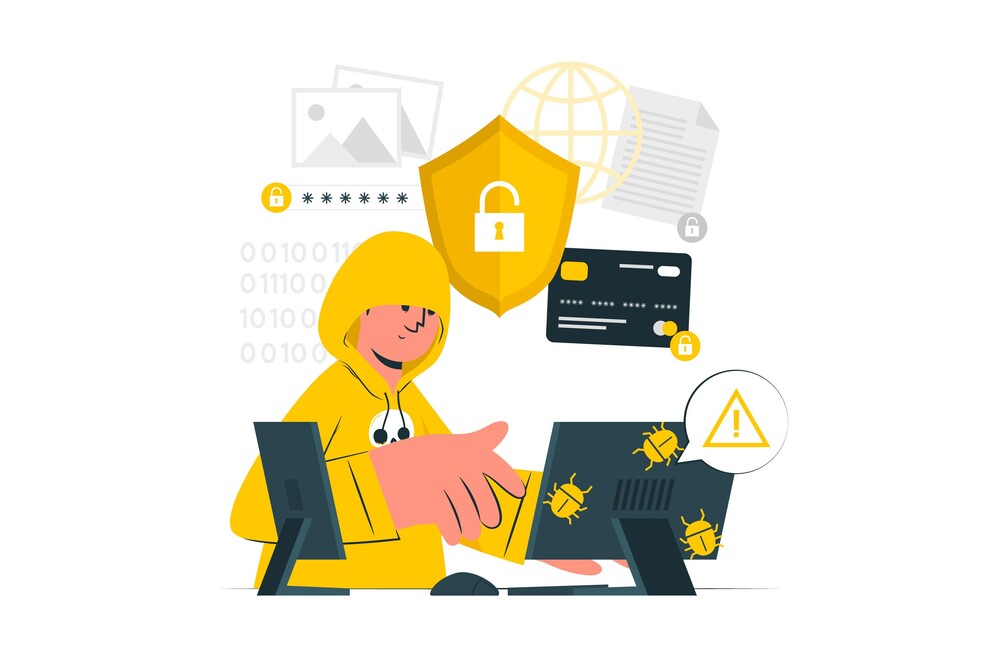
Safeguard your enterprise with our guide on Cybersecurity Best Practices for Small Businesses, essential for protecting digital assets.
An effective cybersecurity for small businesses is a comprehensive assessment of vulnerabilities and risks. Businesses can take proactive measures to strengthen their digital security by identifying potential weaknesses in their cybersecurity defenses.
Assessing vulnerabilities involves analyzing various aspects of a business’s technology infrastructure, including software, hardware, networks, and systems. This process helps identify potential entry points for cyberattacks and exposes any existing security gaps that may put the business at risk.
Small businesses can use several methods and tools to assess their vulnerabilities and risks. One commonly used method is penetration testing, where ethical hackers simulate real-world cyberattacks to identify vulnerabilities. This approach can uncover hidden weaknesses that may not be apparent through standard security measures.
Another method is vulnerability scanning, which involves using automated tools to scan networks and systems for known vulnerabilities. This process gives businesses an overview of their cybersecurity posture and helps prioritize remediation efforts.
Assessing vulnerabilities and risks is crucial for small businesses to stay ahead of cyber threats. By proactively identifying weaknesses in their cybersecurity defenses, businesses can take targeted actions to secure their digital assets and protect their sensitive information from unauthorized access.
By utilizing various assessment methods and tools, businesses can gain a comprehensive understanding of their cybersecurity posture and effectively mitigate potential threats.
Establishing Strong Password Policies
In today’s time, where cybersecurity threats are ever-present, establishing strong password policies is a critical measure to safeguard your business’s digital assets and sensitive information. A weak password can make your systems vulnerable to malicious attacks and unauthorized access. By creating and managing secure passwords, you can significantly enhance your cybersecurity defenses and protect your business from potential breaches.
The Significance of Strong Password Policies
Strong password policies serve as an essential defense mechanism against cyber threats. They help prevent unauthorized individuals from gaining access to your systems and confidential data, reducing the risk of data breaches and financial losses.
Guidelines for Creating Secure Passwords
Creating secure passwords is a crucial aspect of establishing strong password policies. Here are some key guidelines to follow:
- Length: The longer the password, the harder it is to crack. Aim for a minimum of 12 characters.
- Complexity: Include a combination of uppercase and lowercase letters, numbers, and special characters.
- Avoid Common Patterns: Don’t use sequential numbers, repeated characters, or easily guessable phrases.
- Unique Passwords: Avoid reusing passwords across multiple accounts or systems. Use a unique password for each login.
- Regular Updates: Change passwords periodically, ideally every 90 days, to maintain security.
Managing Passwords Effectively
Managing passwords effectively is crucial to maintaining the integrity of your password policies. Consider the following tips:
- Password Managers: Utilize password management tools to securely store and organize your passwords.
- Multi-Factor Authentication: Implement multi-factor authentication to add an extra layer of security.
- Employee Training: Educate your employees about the importance of strong passwords and provide training on password best practices.
- Regular Auditing: Conduct regular audits to ensure compliance with password policies and identify any potential weaknesses.
Remember, implementing strong password policies is a fundamental cybersecurity measure that can go a long way in protecting your business. By following these guidelines and empowering your employees with the knowledge to create and manage secure passwords, you can significantly reduce the risk of cyber threats and keep your business secure.
Implementing Robust Network Security
Small businesses face significant cybersecurity threats in today’s time. Protecting sensitive data and preventing unauthorized access to networks is crucial for maintaining the privacy and integrity of business operations. Implementing robust network security measures is essential to safeguard small businesses from cyber attacks and data breaches.
There are various strategies and tools that small businesses can adopt to enhance their network security. Let’s explore some of the key measures:
1. Firewalls:
A firewall acts as a protective barrier between a business’s internal network and the internet. It monitors and controls incoming and outgoing network traffic, filtering out potential threats and unauthorized access attempts. Small businesses should consider deploying a robust firewall solution to ensure network security.
2. Encryption:
Small businesses can utilize encryption techniques to secure their network communications, emails, and stored data. Incorporating encryption protocols and secure communication channels adds an extra layer of protection against cyber threats.
3. Network Monitoring Systems:
Implementing network monitoring systems enables small businesses to actively track and detect any suspicious activities on their networks. These systems can alert business owners or IT teams about potential security breaches, enabling them to respond promptly and mitigate any potential risks.
4. Regular Updates and Patch Management:
Keeping software, systems, and network devices up to date is vital for network security. Small businesses should establish a regular update and patch management process to address any known vulnerabilities in their software and firmware. Applying security patches and updates promptly helps to safeguard against the latest cyber threats.
5. Employee Security Training:
Human error is often exploited in cyber attacks, making employee security training crucial for small businesses. Educating employees about best practices for network security, such as recognizing phishing emails, using secure passwords, and reporting suspicious activities, can significantly minimize the risk of network breaches.
By implementing these robust network security measures, small businesses can enhance their cybersecurity posture and protect themselves against evolving cyber threats. Strong network security not only safeguards sensitive data but also instills trust among customers, partners, and stakeholders, positioning small businesses as reliable and secure entities in the digital realm.
Educating Employees on Cybersecurity Awareness
cybersecurity awareness is more crucial than ever for businesses of all sizes. While implementing effective security measures is essential, it is equally important for small businesses to educate their employees on cybersecurity best practices.
A comprehensive cybersecurity training program is key to equipping employees with the knowledge and skills needed to recognize and respond to potential cyber threats. This program should cover a range of topics including:
- The importance of maintaining strong passwords and utilizing two-factor authentication
- Identifying phishing emails and how to avoid falling victim to social engineering attacks
- Best practices for securely handling sensitive data and using company devices
- Recognizing and reporting suspicious activity or potential security breaches
Creating a supportive environment where employees feel comfortable reporting potential threats and seeking guidance is essential. Regularly communicating updates and reminders about cybersecurity practices through company-wide emails, newsletters, or intranet platforms can help reinforce the importance of maintaining security protocols.
“Employees are often the weakest link in an organization’s cybersecurity defenses. By educating and empowering them with the knowledge needed to identify and mitigate potential risks, businesses can significantly decrease their vulnerability to cyberattacks.” – Cybersecurity Expert
Organizations can also consider gamified training modules, interactive workshops, or even simulated phishing exercises to engage employees and reinforce key concepts. These initiatives not only improve cybersecurity awareness but also create a sense of responsibility among employees to protect the company’s digital assets and sensitive information.
Key Takeaways:
- Educating employees on cybersecurity awareness is crucial for small businesses
- A comprehensive cybersecurity training program should cover various topics
- Fostering a culture of security awareness is essential
- Gamified training modules and interactive workshops can enhance engagement
Regularly Updating Software and Systems
Regular software updates and system maintenance play a pivotal role in safeguarding the security of your small business. Ignoring or delaying updates can leave your systems vulnerable to cyber threats and compromise the integrity of your sensitive data. By prioritizing software updates and system maintenance, you can proactively strengthen your defense against potential security breaches and ensure the longevity of your digital infrastructure.
Software Updates:
Software updates are not just about adding new features or improving functionality; they are also vital for fixing vulnerabilities and bugs that can be exploited by malicious actors. Developers constantly release updates to patch security loopholes and address known threats, making it imperative for small businesses to promptly install these updates. Failure to do so can leave your systems exposed to hackers looking for easy targets.
System Security:
Regularly updating your systems also helps maintain the overall security posture of your small business. Outdated operating systems, firmware, or plugins can serve as gateways for cybercriminals to gain unauthorized access, potentially leading to data breaches, financial losses, and reputational damage. By promptly installing security patches and updates, you ensure that your systems are fortified against the latest threats.
Implementing a proactive approach to software updates and system security involves a few best practices:
- Stay Informed: Keep yourself informed about the latest software vulnerabilities and security updates released by vendors. Subscribe to their newsletters or follow reputable cybersecurity blogs to stay updated on any critical patches or bug fixes.
- Automate Updates: Enable automatic updates whenever possible to streamline the process. This ensures that your software and systems receive essential security patches without relying on manual interventions that may be overlooked or delayed due to time constraints.
- Test Updates: Before deploying updates across all systems, conduct a testing phase to ensure that the updates do not cause any conflicts or disruptions. This helps mitigate any potential risks that might arise from incompatible updates.
- Backup and Recovery: As a precautionary measure, regularly backup your critical business data to ensure quick recovery in the event of a system failure or cyber attack. This helps minimize downtime and ensures essential data integrity.
Backing Up Data and Disaster Recovery Plans
Data is the lifeblood of businesses, making data backup and disaster recovery planning critical components of a comprehensive cybersecurity strategy. Small businesses must recognize the importance of safeguarding their valuable data and ensure they have measures in place to recover from potential cyber incidents.
Data Backup: Implementing regular data backup practices is essential for small businesses to protect against data loss. By creating duplicate copies of important files, documents, and databases, businesses can mitigate the risks associated with hardware failure, ransomware attacks, or accidental deletion. To effectively backup data, small businesses should follow these best practices:
- Identify critical data: Determine the most essential files and systems that require backup. This includes customer data, financial records, intellectual property, and any other data crucial for business operations.
- Choose an appropriate backup solution: Small businesses can opt for cloud-based solutions, external hard drives, or network-attached storage (NAS) devices. It’s important to select a reliable and secure option that meets specific business requirements.
- Automate the backup process: Manual backups are susceptible to error or oversight. By automating the backup process, businesses can ensure that data is consistently and reliably backed up.
- Test backup integrity: Regularly test the backup files to ensure they can be successfully restored.
- Store backups securely: Keep backups in a secure location, either off-site or in a secure cloud environment. This protects against physical damage or theft, ensuring that data can be easily accessed when needed.
“Data backup is not just about protecting against cyber threats; it’s also about safeguarding against equipment failure, human errors, or natural disasters. By having a reliable backup system in place, small businesses can reduce downtime and maintain continuity in their operations.”
Disaster Recovery Planning: Data backup, small businesses must develop robust disaster recovery plans to minimize the impact of cyber incidents. These plans outline the necessary steps and procedures to restore business operations following a disruption. When creating a disaster recovery plan, consider the following:
- Identify potential risks and scenarios: Conduct a thorough risk assessment to identify potential cyber threats and their potential impact on business operations. This helps tailor the disaster recovery plan to address specific vulnerabilities.
- Establish recovery time objectives (RTO) and recovery point objectives (RPO): RTO refers to the acceptable downtime for different systems or processes, while RPO determines the maximum amount of data loss acceptable in the recovery process.
- Create a clear communication plan: In the event of a cyber incident, it’s crucial to have a communication plan in place to ensure effective coordination and information sharing among employees, stakeholders, and external parties.
- Test the disaster recovery plan: Regularly test the plan to identify any weaknesses or gaps. This allows businesses to refine their processes and ensure a smooth and efficient recovery in the event of an actual incident.
- Train employees: Educate employees about their roles and responsibilities in the event of a cyber incident. Conduct regular training sessions to enhance their awareness and preparedness.
Data Backup Solutions Comparison
| Backup Solution | Pros | Cons |
|---|---|---|
| Cloud-based | Easy accessibility, scalability, automatic backups, off-site storage | Dependent on internet connectivity, potential security concerns |
| External hard drives | Affordable, portable, no reliance on internet connection | Prone to physical damage or theft, limited storage capacity |
| Network-attached storage (NAS) | Secure, centralized storage, convenient access within the local network | Higher upfront cost requires technical expertise for setup and maintenance |
By implementing effective data backup practices and developing disaster recovery plans, small businesses can minimize the risks associated with data loss and ensure the resilience of their operations. Regularly reviewing and updating these processes is crucial in an ever-evolving cybersecurity landscape.
Conclusion
Implementing effective cybersecurity best practices is vital to protect your digital assets and sensitive information from ever-evolving threats.
By assessing vulnerabilities and risks, establishing strong password policies, implementing robust network security measures, educating employees on cybersecurity awareness, regularly updating software and systems, and backing up data while having disaster recovery plans in place, small businesses can significantly enhance their cybersecurity posture and mitigate potential risks.
Remember, cybersecurity is an ongoing process. It requires constant vigilance and proactive measures. We urge you to prioritize cybersecurity within your organization and ensure that all employees are educated and engaged in maintaining a secure digital environment.
Take action today and fortify your cybersecurity defenses. Your business’s future may well depend on it.
Ready to innovate and transform your business? Say hello to CodeBeavers!
If you are looking for ways to bring your product or app ideas to life? We’ve got your back. CodeBeavers has the tools and engineers you need to make your projects come alive. With CodeBeavers, you’ll be able to build faster than ever, deploy code with ease, and scale like never before. Send us your requirements now, and let’s start winning together.




